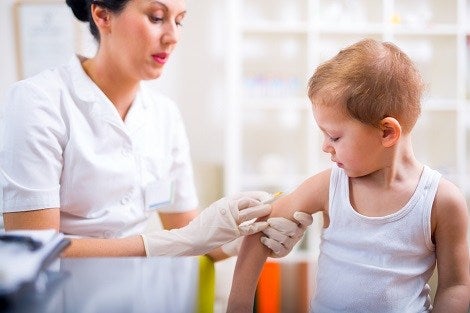For immediate release: March 21, 2018
Boston, MA – A resurgence of mumps in the U.S. among vaccinated young adults appears to be due to waning of vaccine-induced immunity, according to a new analysis from Harvard T.H. Chan School of Public Health.
Researchers found that vaccine-derived immune protection against mumps persists an average of about 27 years after the last dose. The findings suggest that, in addition to the currently recommended two doses of mumps vaccine in childhood, a third dose at age 18 or booster shots may help sustain protection among adults.
The study was published March 21, 2018, in Science Translational Medicine.
“This analysis helps address a persistent question surrounding the recent mumps outbreaks, pointing to the key role played by waning vaccine induced immunity, and helps frame the research and policy questions on how best to control mumps,” said Yonatan Grad, assistant professor of immunology and infectious diseases at Harvard Chan School, who co-authored the study with Joseph Lewnard, postdoctoral research fellow at Harvard Chan School’s Center for Communicable Disease Dynamics.
After the mumps vaccine was introduced in the mid-1960s, mumps incidence in the U.S. and other developed countries declined for decades.
After recommendations for children to receive a second vaccine dose were issued in 1989, sustained reductions in mumps incidence led to optimism that vaccination could eliminate the disease from the U.S. in the long term.
But recent mumps outbreaks, including on college campuses, began occurring among vaccinated young adults around 2006 and have continued to the present. The resurgence is troubling, the authors wrote, because mumps infections may cause complications such as testicular inflammation (which may result in infertility), meningitis, and deafness. Since cases have predominantly occurred in vaccinated populations, the mumps resurgence has prompted questions about what’s to blame—either waning immune protection from the mumps vaccine or new strains of the mumps that evade vaccine-driven protection.
In the new study, Harvard Chan School researchers pooled and analyzed data from six epidemiological studies of mumps vaccine effectiveness conducted over past decades in the U.S. and Europe. The researchers estimated that 25% of people in the U.S. vaccinated against mumps may lose protection within 7.9 years, 50% within 19 years, and 75% within 38 years. Linking data from these studies to a mathematical model of mumps transmission, the researchers determined that waning immunity has played a central role not only in the recent re-emergence of mumps cases among young adults, but also in outbreaks that occurred in the late 1980s among adolescents who had received only one dose under earlier recommendations.
In contrast, the researchers found no evidence that new strains of mumps virus are contributing to changes in vaccine effectiveness. Moreover, their model suggested that new strains would not be expected to cause cases in age groups affected by recent outbreaks.
“Vaccination is the centerpiece of current public health strategy against mumps,” said Lewnard. “Knowing that protection wanes in the long term can help inform how we deploy vaccines to prevent or contain future outbreaks.”
Funding for the study came from National Institute of General Medical Sciences award U54GM088558 and a Doris Duke Charitable Foundation Clinical Scientist Development award.
“Vaccine waning and mumps re-emergence in the United States,” Joseph A. Lewnard and Yonatan H. Grad, Science Translational Medicine, March 21, 2018, doi: 10.1126/scitranslmed.aao5945
Visit the Harvard Chan School website for the latest news, press releases, and multimedia offerings.
For more information:
Todd Datz
tdatz@hsph.harvard.edu
617.432.8413
photo: iStockphoto.com/Jovanmandic
###
Harvard T.H. Chan School of Public Health brings together dedicated experts from many disciplines to educate new generations of global health leaders and produce powerful ideas that improve the lives and health of people everywhere. As a community of leading scientists, educators, and students, we work together to take innovative ideas from the laboratory to people’s lives—not only making scientific breakthroughs, but also working to change individual behaviors, public policies, and health care practices. Each year, more than 400 faculty members at Harvard Chan School teach 1,000-plus full-time students from around the world and train thousands more through online and executive education courses. Founded in 1913 as the Harvard-MIT School of Health Officers, the School is recognized as America’s oldest professional training program in public health.
